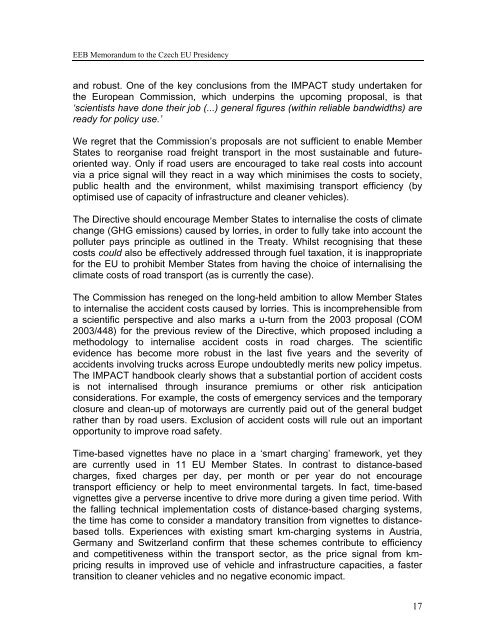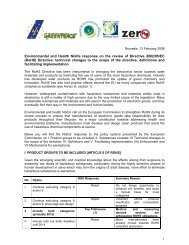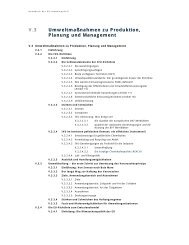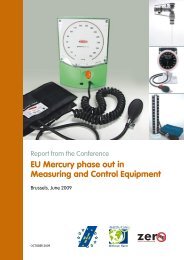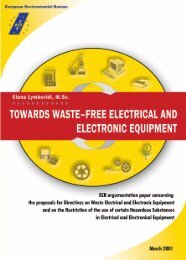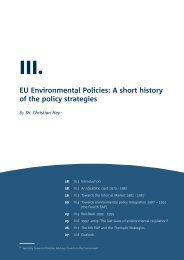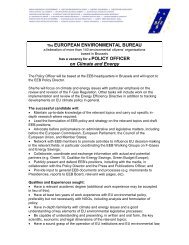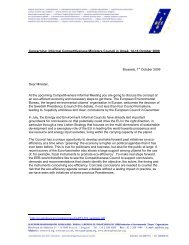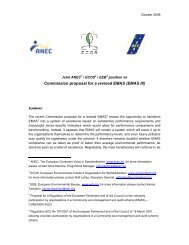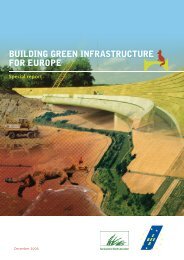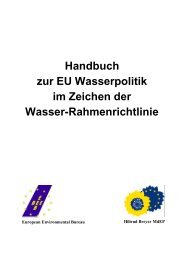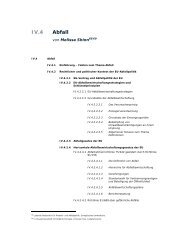Memorandum to Czech Presidency and Ten Test - EEB
Memorandum to Czech Presidency and Ten Test - EEB
Memorandum to Czech Presidency and Ten Test - EEB
- No tags were found...
You also want an ePaper? Increase the reach of your titles
YUMPU automatically turns print PDFs into web optimized ePapers that Google loves.
<strong>EEB</strong> <strong>Memor<strong>and</strong>um</strong> <strong>to</strong> the <strong>Czech</strong> EU <strong>Presidency</strong><strong>and</strong> robust. One of the key conclusions from the IMPACT study undertaken forthe European Commission, which underpins the upcoming proposal, is that‘scientists have done their job (...) general figures (within reliable b<strong>and</strong>widths) areready for policy use.’We regret that the Commission’s proposals are not sufficient <strong>to</strong> enable MemberStates <strong>to</strong> reorganise road freight transport in the most sustainable <strong>and</strong> futureorientedway. Only if road users are encouraged <strong>to</strong> take real costs in<strong>to</strong> accountvia a price signal will they react in a way which minimises the costs <strong>to</strong> society,public health <strong>and</strong> the environment, whilst maximising transport efficiency (byoptimised use of capacity of infrastructure <strong>and</strong> cleaner vehicles).The Directive should encourage Member States <strong>to</strong> internalise the costs of climatechange (GHG emissions) caused by lorries, in order <strong>to</strong> fully take in<strong>to</strong> account thepolluter pays principle as outlined in the Treaty. Whilst recognising that thesecosts could also be effectively addressed through fuel taxation, it is inappropriatefor the EU <strong>to</strong> prohibit Member States from having the choice of internalising theclimate costs of road transport (as is currently the case).The Commission has reneged on the long-held ambition <strong>to</strong> allow Member States<strong>to</strong> internalise the accident costs caused by lorries. This is incomprehensible froma scientific perspective <strong>and</strong> also marks a u-turn from the 2003 proposal (COM2003/448) for the previous review of the Directive, which proposed including amethodology <strong>to</strong> internalise accident costs in road charges. The scientificevidence has become more robust in the last five years <strong>and</strong> the severity ofaccidents involving trucks across Europe undoubtedly merits new policy impetus.The IMPACT h<strong>and</strong>book clearly shows that a substantial portion of accident costsis not internalised through insurance premiums or other risk anticipationconsiderations. For example, the costs of emergency services <strong>and</strong> the temporaryclosure <strong>and</strong> clean-up of mo<strong>to</strong>rways are currently paid out of the general budgetrather than by road users. Exclusion of accident costs will rule out an importan<strong>to</strong>pportunity <strong>to</strong> improve road safety.Time-based vignettes have no place in a ‘smart charging’ framework, yet theyare currently used in 11 EU Member States. In contrast <strong>to</strong> distance-basedcharges, fixed charges per day, per month or per year do not encouragetransport efficiency or help <strong>to</strong> meet environmental targets. In fact, time-basedvignettes give a perverse incentive <strong>to</strong> drive more during a given time period. Withthe falling technical implementation costs of distance-based charging systems,the time has come <strong>to</strong> consider a m<strong>and</strong>a<strong>to</strong>ry transition from vignettes <strong>to</strong> distancebased<strong>to</strong>lls. Experiences with existing smart km-charging systems in Austria,Germany <strong>and</strong> Switzerl<strong>and</strong> confirm that these schemes contribute <strong>to</strong> efficiency<strong>and</strong> competitiveness within the transport sec<strong>to</strong>r, as the price signal from kmpricingresults in improved use of vehicle <strong>and</strong> infrastructure capacities, a fastertransition <strong>to</strong> cleaner vehicles <strong>and</strong> no negative economic impact.17


